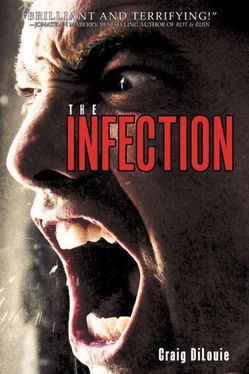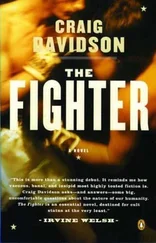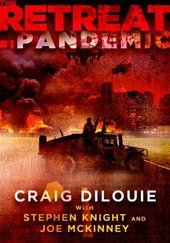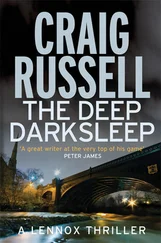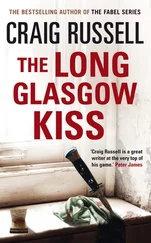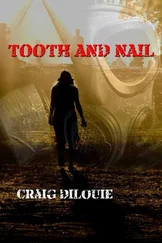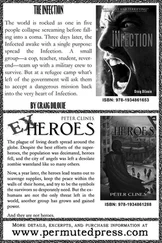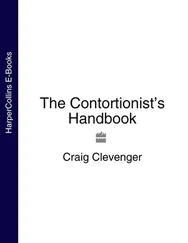All Ray could think at the time was, I don’t want that to be me.
The truck radio shouted at him until he turned it off.
He drove home and loaded his rig with everything he could get his hands on. Food, beer, liquor, cigarettes and dip, jugs of water, packets of Kool-Aid, burritos and TV dinners. He restarted his truck, turned on the radio and flipped across the shouting voices until he found the local AM news station, which promptly began emitting the emergency broadcast signal.
He turned off the radio. It’s better this way, he told himself. I don’t want to know.
He drove back to the storage facility, locked the chain-link fence behind him, and then sealed himself inside one of the storage sheds with somebody else’s dusty furniture.
Ray stayed in there for five days until he ran out of booze, the last set of batteries failed in his flashlight, and he could no longer stand the stench of his own waste.
He opened the garage door and emerged into a brave new world.
The camp was already sprawling, bursting out of Cashtown until it reached the self-storage facility. Some of the storage units were being plundered to make room for refugees. He stood there for fifteen minutes, blinking in the sunlight with his mouth open, trying to understand it, his head pounding with the worst hangover of his life. After what he had seen on the first day of Infection, he had thought he would find the town abandoned by the living. Instead, he found a thriving refugee camp with the population of Boulder, Colorado.
Not a very noble way to survive that first deadly week of Infection, but the point is he emerged . The point is he survived .
There is no honor in survival, but life goes on and life is everything. Nothing else matters. And anybody who thinks differently is a fool—a fool who probably won’t live very long.
Most of his friends were dead. The town had five governments. Four families were living in his mother’s house, which had already been looted top to bottom. Some of them he recognized as his former neighbors. Many of the locals had tried to cash in, selling land to the government and basic necessities to the refugees at outrageous prices, trading everything they had for a pile of paper money that rapidly declined in value until it became virtually worthless. Some of the more important and civic-minded locals, however, became entrenched with the government. They knew Ray and trusted him and they needed to beef up community policing fast.
So Ray became a lawman and, in the process, a true believer in making the world right again. He was good at it. His only regret was that his mother was not alive to see him do it.
When he found out Wendy was a Pittsburgh police officer, it had been like meeting an angel. The news of the burning of the city had hit the camp like a thunderbolt. People walked around in a daze, unable to comprehend it. By the time Wendy showed up at the police station, the fire had already become a legend. That made her something of a miracle, rare and precious.
Which is why he came, to protect her. The part of Ray Young that he has been finding out is good believes that if he can protect her, he can help make the world right again.
As for the part of him that is bad, the part he knows all too well, that part also wants to see the world return to normal. Ray is tough and morally ambivalent, he can be a bully and violent on a whim, but he has no wish to live in a world in eternal fear of being wiped out by a horde of diseased, homicidal maniacs. He longs for the day when he can get drunk on payday, throw a bottle through a window, and take a swing at honest cops who come to arrest him. He was a loser back in the day, that is true, while he is an important man now. But he was a loser who was certain to live a long life of petty amusements in a town he loved. He wants the world to get back to normal: a world where beer is manufactured and sold cheaply in mass quantities, tobacco farmers are free to harvest their crops unmolested, and women are loose and have easy access to birth control.
He came for reasons both selfless and selfish, but none of that matters now.
Now that he is here, all he wants to do is live.
♦
The numbers of Infected multiply as they approach Steubenville along Route 22, the Bradley breaking their bodies with sickening thuds, the buses sending them flying with their V-shaped highway truck snowplows that had been retrofitted onto their grilles. They bypass the town along the north, their view of it obscured by a treed slope that gradually turns into a concrete wall. The fronts of the vehicles are splashed with blood; the windshield wipers are working full time. The Bradley crashes through a guide panel mounted on a sagging overhead gantry and announcing ROUTE 7 SOUTH STEUBENVILLE, smashing it into flying green shards that flutter and scatter across the highway. The Infected race towards the buses, squealing and pounding on their sides painted with special messages: HELLO, NOW DIE AND NONE SHALL PASS AND INSTANT CURE! inquire within.
Sarge says into the intercom, “We’re approaching the bridge. Stay frosty.”
Wendy glances at him with wide eyes, her face pale and pouring sweat.
“Eyes forward,” he says, then adds gently, “You’re okay, babe.”
“This is different than before. This is not just survival. This is a mission.” She shakes her head briefly before returning her attention to the ISU. “We’re fighting a war now.”
“Don’t matter what you want to call it. Either way, people’s lives are riding on what you do, so you make sure you do right. You do the best you can.”
“It’s too much this time. I’m scared.”
“Only crazy people don’t get scared. Being scared is perfectly normal. You just have to control it so it don’t control you.”
“How?”
“You take things one step at a time. Each minute as it comes.”
She nods, licking her dry lips. “Okay,” she rasps.
“Baby steps. Right now, all we got to do is drive.”
The bridge appears in the distance on the left, growing larger by the minute. Sarge glances at the instrumentation, pleased that none of the critical annunciator lights are lit up or flashing at him, which would indicate a problem with a vital system. He activates the intercom.
“Get into your battle rattle,” he says, trying to sound upbeat. “We’ll be in the shit in less than ten and back home in a few hours.”
No macho cheering or theatrical complaining comes back to him from the passenger compartment, just cold silence. He reminds himself that this is a different kind of war. A war of fratricides. A war of genocide against people they once loved.
Nobody wants to cheer in this kind of war until it’s over.
The bridge looms on the left, dominating the view against a gray sky that darkens towards the horizon like a distant storm. Waves of heat ripple at the horizon’s edge, Pittsburgh continuing to give up its ghost. The appearance of the bridge itself, a wonder of modern engineering appearing suddenly after miles of empty country, is almost as startling as the memory of the fire. An overhead road sign declares EAST 22 NORTH 2 WEIRTON PITTSBURGH. The convoy slows as it comes together in single file, exiting for the interchange.
Honking loudly, a line of Brinks armored cars and flatbed trucks at the tail of the convoy breaks off, continuing south along Route 7 into Steubenville. These troops are headed to the Market Street Bridge, just a few miles to the south of the Veterans Memorial Bridge, an old light rail suspension bridge built in 1905 that was later upgraded into a two-lane crossover for vehicles. Seven thousand cars and trucks crossed that bridge every day before the end of the world. Now it is used only by monsters.
Читать дальше
